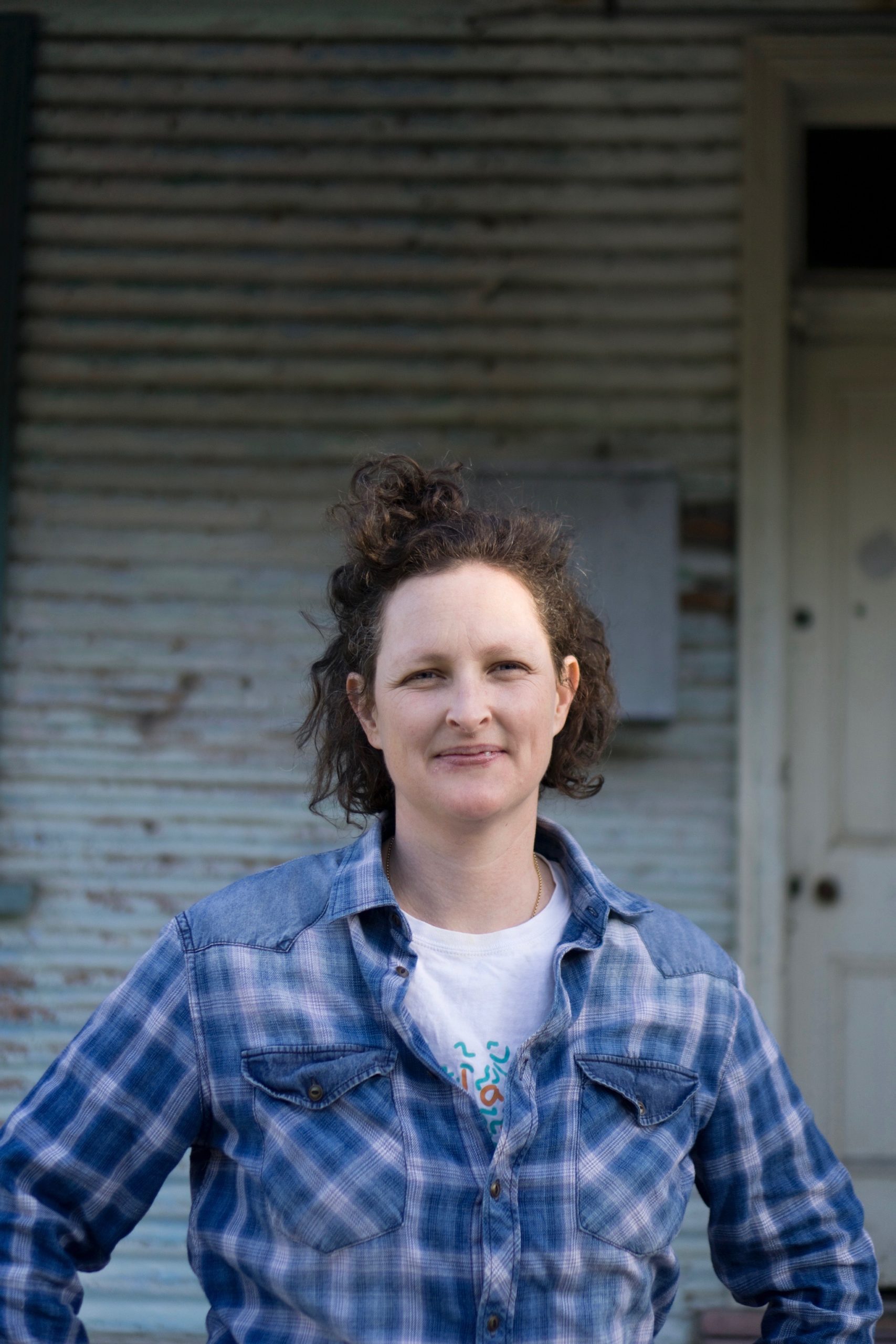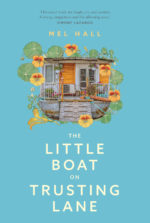It takes a village to raise a book (an ode to the Perth writing community) by novelist Mel Hall

Described as ‘thoughtful’, ‘delightfully subversive’ and ‘tenderly insightful’, The Little Boat on Trusting Lane by Mel Hall is a novel about how human connection, community and friendship have the potential to heal. In this piece, she describes how the Perth writing community helped her bring her debut novel into being.
I first heard of Fremantle Arts Centre Press in the 90s, when I was a kid. My granny – Jennifer Hall – had submitted a manuscript there, which received interest, but further work was requested. But Granny didn’t want to make the suggested changes, so the book went unpublished.
I always liked talking to Granny about writing; it was something we both loved. But when I was older, and asked if she was disappointed her book wasn’t published, she shook her head. Her attitude was, ‘this is the book, take it or leave it’.
This was something I always found difficult to understand, but I felt as I got older that it made more sense. Writing is a reward in itself; publication is something separate. Still, when I talked to my granny about writing, I secretly hoped that one day, I might have a book published.
*

The next time I heard about Fremantle Press was in 2003. My then-boyfriend’s housemate Nathan Hobby had just won an award called the Hungerford. We used to hear Beethoven coming from Nathan’s room in the middle of the night while he wrote. Sometimes he would emerge, spend some time in the kitchen looking very serious, then return to his room with a bowl of rice.
Soon, I became friends with Nathan. I showed him some of my writing – a reflective journal for an Education subject at uni. He read some aloud and said how much he liked it.
When Nathan’s book The Fur was launched (at Clancy’s in Freo; we chatted and ate chips from cones), he wrote in my copy, ‘To Melanie, keep writing. You’re talented!’
I am still friends with Nathan; he is one of my close writing buddies. Nathan’s biography of Katharine Susannah Prichard will be published later this year by Melbourne University Press.
*
Also back in 2003, I took my first creative writing class at uni. It was a poetry class at the University of Western Australia, and my tutor’s name was Meg McKinlay. I wrote some really bad poems in that class. Meg showed us one of hers (via on overhead projector) that made a child’s comparison between cats and CAT scans. I know that several of us in the class got teary.
Meg put time into reading my (large amounts) of (much lesser-quality) poetry. (This was an enthusiastically written bundle of pages, separate from our assignments. She had no obligation to read it.) Meg didn’t tell me anything was outright bad. But she did point to the (few) moments where images or lines really worked. I left the class understanding that literature can be powerful, but it is also complex, and involves hard work.
Even just a few years ago, Meg remembered me, and agreed to catch up to talk about writing. We went to Parlapa in Fremantle and ate delicious homemade pasta. Meg told me how she doesn’t see herself as a storyteller, but when she writes, she works from something more abstract, like a concept, or a line. I thought, Yes, this is how I am too. Later, she read my novella, and emailed to say how much she enjoyed it. At that moment, I felt like I had made it.
Meg has written many award-winning children’s books and young adult books, many published by Fremantle Press. Her book Bella and the Voyaging House comes out this year, a few months after mine. She wrote a book about a voyaging house, while I wrote about a boat that stands still.
*

My next writing teacher – who became my honours supervisor – was Brenda Walker. I learned, well into my classes, that Brenda had won the inaugural Hungerford for her novel Crush.
With Brenda’s guidance, I began to see some clear strengths and weaknesses in my writing. She was never harsh in her criticism, but somehow, with a gentle approach – always accompanied by a mug of milky Earl Grey tea – she showed me my tendency to overwrite. Under her supervision, I wrote two stories and a novella, and all were published.
Brenda was generous enough to meet up with me, here and there, many times after my graduation. It’s as though she continued on as a mentor. She said something I’ll never forget – although I think it was a flippant, throwaway line: ‘To be a good writer, first you need to learn how to walk along the beach and eat a packet of Tim Tams.’ I think of this advice when I am feeling stressed, too highly strung as I attempt to finish a piece of writing. No, I need to stop, breathe, relax. I need to let some carefree, spacious feeling – the vibe of chocolate-eating, or splashing in waves – into the pages. A finished piece of writing should always be at ease in itself.
*
I took time away from writing and study for quite a few years. I focused on playing music and working with food. But in 2016, I began having ideas for a novel, and looked for support. I applied for something called the Spring Story Retreat at KSP Writers’ Centre, which was a chance to spend a weekend being mentored by Laurie Steed.
I was accepted into the retreat. However, Laurie got very sick and the retreat was postponed. I unfortunately couldn’t attend the postponed version, but Laurie went ahead and helped me anyway. The novel I was working on was called The Shapes, which eventually became The Little Boat on Trusting Lane.
I’ve since met David Allan-Petale, and learned that he was on this retreat, working on the book that became Locust Summer, which comes out with Fremantle Press very soon. Also, Laurie’s mentor – Susan Midalia – has a book called Everyday Madness that is out with Fremantle Press now.
*
Around that time, I decided to apply to go back to uni and do a creative writing PhD. I emailed different teachers at different universities and said to myself that if I had a few offers for supervision, I would go with whoever seemed the friendliest.
Shortly after this decision, I had a lovely email from Simone Lazaroo, then an academic at Murdoch University. She wrote to me about writing and university, but also the weather, and wished me a good weekend. I had read and loved her book The Australian Fiancé, and couldn’t believe my luck that she wanted to supervise me. I also learned (not from her, from Wikipedia) that Simone had won the Hungerford award for her book The World Waiting to Be Made.
I have had three Hungerford award winners in my life; each have been incredibly supportive and generous with me. Simone has been supervising me on my work in progress Judas Bones for the past three years. But she has read and given me support not just with this work, but with several pieces of my writing. With her guidance, I have felt able to relax and grow into my writing skin.
*
In 2018, I reapplied for the Spring Story Retreat, still for The Shapes. I got in, and had my lucky second chance to work with Laurie. Laurie helped me so much with my book that I decided that if it were ever published, I would dedicate it to him.
My fellow writers I spent the weekend with were Emma Young and Emily Sun, who have since both been awarded publishing contracts with Fremantle Press; Emma’s book, The Last Bookshop, has gone to reprint within three days of being published, and Emily’s collection of poems, Vociferate, is out soon.
*
I didn’t know this when I applied for the retreat, but KSP were to nominate us three recipients (as well as other writers from the centre) for the Four Centres Emerging Writers Program, a pilot program to support writing in Western Australia, run by Fremantle Press.
And so, at several events over the next few years, I learned many aspects of being an author by people from Fremantle Press: from social media, interviewing, digital marketing, editing and revisions to public speaking and writing synopses. Brenda Walker even came to speak to us at one event; she was witty and insightful, and I was proud to say that she’d been my writing teacher.
I also met some wonderful writing humans through the program. At the very first event, Josephine Taylor walked up to me, just after we’d all been sitting in a circle, introducing ourselves. In my introduction, I had said I like to write about chronic pain and magical thinking. Jo walked up and said, ‘We write about similar stuff. I’d really like to talk to you.’ We had some chats, about her experience with vulvodynia, and my experience with spinal arthritis. Now, her book, Eye of a Rook, is out with Fremantle Press, to much praise. We are scheduled in for an interview together on RTR in May, to talk about how creative expression can help with the management of chronic pain.
*
Finally, in 2019, after much work on my manuscript, I submitted The Shapes to the inaugural Fogarty Literary Award, and was thrilled to be longlisted. As part of being longlisted, I was invited in to Fremantle Press to talk to Armelle Davies and Georgia Richter about my manuscript.
I thought about my granny before I pushed open the door to Fremantle Press. I thought of how long I’d been writing, the time I’d already spent on this book. I knew that writing – as an act, as a process – will always be one of the most important things to me. Writing will always be more important than getting published.
Yet I also felt somewhat deflated coming through the doors, knowing that it would be quite nice to be published, and knowing that my chances of being published were slim. As much as I loved writing in itself, I really wanted my book to come into the world.
But then I had this wonderful conversation with Armelle and Georgia. Something unlocked in my mind. I went away, and in a few weeks I had rewritten the book and resubmitted. In a few months, I received a phone call to say Fremantle would be offering me a publishing contract. I got off the phone, shook, and wept.
My book is coming out soon. When I look back at the journey that led to it being published, I can see how many people have supported, encouraged and buoyed me along the way. Many of these generous people have been somewhat connected to Fremantle Press, and all have been active in the Perth writing community.
They say Perth is a big country town. I’d say that the Perth writing community feels a bit smaller, like a village. It’s a very supportive village, one that has helped to raise this book.
The Little Boat on Trusting Lane will be arriving soon. I will be so proud to show it off to you.
The Little Boat on Trusting Lane is available in May from all good bookstores and online. Pre-order your copy now or join Mel at the Great Big Book Club hosted by Natasha Lester and Georgia Richter on Sunday 27 June at Joondalup Public Library.










